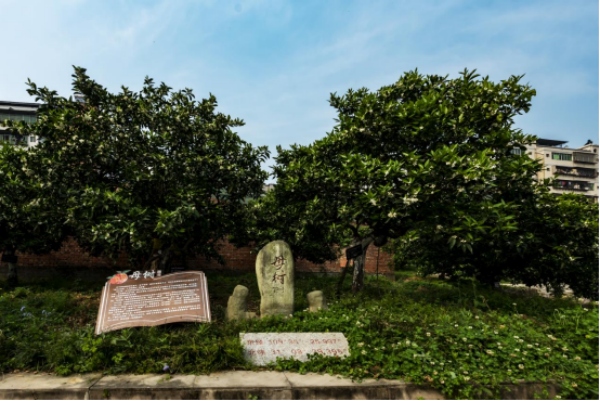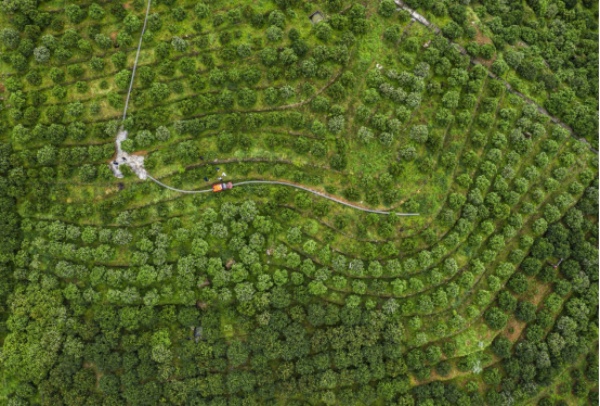




- BRNN
- BRI News
- BRNN News
- Database
Official Documents Polices and Regulations
Inter-government Documents International Cooperation BRI Countries
Business Guide Economic Data BRI Data
Trade
Investment Projects Latest projects
Cases - Content Pool
Fengjie county in southwest China's Chongqing Municipality signed export contracts totaling more than 10,000 tonnes of navel oranges with companies from Singapore and Malaysia at a recent promotional event.
Fengjie has long been known as a land of citrus, with a cultivation history dating back to the Han Dynasty (202 B.C.-220 A.D.).
Large-scale planting began in the past two decades. As small coal mines were closed and desertified lands restored, new farmland became available. Following careful research, locals decided to grow navel oranges — a choice that made efficient use of hillside terrain, prevented soil erosion, and increased farmers' incomes.

Photo shows navel orange trees in Fengjie county, southwest China's Chongqing Municipality. (Photo courtesy of the Media Convergence Center of Fengjie County)
Today, after nearly 20 years of development, navel orange trees blanket the mountains on both sides of the reservoir. Many local farmers have built better lives thanks to the navel orange industry.
Fengjie had 383,000 mu (25,533 hectares) of navel orange orchards in 2024, producing 507,000 tonnes of navel oranges annually and generating over 6.5 billion yuan ($912 million) in comprehensive output value, according to the county's Navel Orange Industry Development Center. The brand's market value has reached 38.17 billion yuan, ranking 20th among China's top 100 geographical indication agricultural brands.
"The pesticide residue standards in supermarkets in Singapore are extremely strict, yet our oranges consistently pass inspection," said Zhou Jian from Chongqing Kuimen International Import and Export Trading Co., Ltd. This confidence reflects Fengjie's comprehensive quality control system, which spans the entire production chain from cultivation to processing.

Aerial photo shows navel orange orchards in Fengjie county, southwest China's Chongqing Municipality. (Photo courtesy of the Media Convergence Center of Fengjie County)
"We now have a 'secret weapon' for orange growing," said local grower Liu Huanyu, opening a mini program called the "Fengjie Navel Orange Industry Brain." The platform combines product traceability with Internet of Things (IoT) sensors that monitor soil moisture and pest activity, enabling precision fertilization, targeted drone spraying, and smart irrigation. This allows for digital management throughout the orange's entire growth cycle.
To reassure overseas consumers, Fengjie has built a traceability system. Each box of exported oranges bears a unique QR code that provides instant access to information on the orchard, fertilization records and test reports.
Fengjie's journey to the global market began with the China-Singapore (Chongqing) Demonstration Initiative on Strategic Connectivity. In 2022, the first batch of Fengjie navel oranges arrived in Singapore via sea-rail intermodal transport, marking their international debut. A year later, a dedicated cold-chain air route enabled 24-hour direct delivery. In 2024, 500 kilograms of premium Fengjie navel oranges were sent to a tasting event in Singapore, where they impressed local supermarkets with their consistent quality.
With government backing, Fengjie is expanding the global presence of locally produced navel oranges. The county organizes local enterprises to participate in international expos such as the Singapore Food Expo and hosts visits by foreign buyers to local orchards.
Fengjie has also built export facilities and actively connected with platforms like the China-Singapore (Chongqing) Demonstration Initiative on Strategic Connectivity, the New International Land-Sea Trade Corridor, and Yumaotong, a trade platform.
The district is home to 70 foreign trade enterprises and has expanded into 18 countries and regions across Southeast Asia and the Middle East, with annual navel orange exports exceeding 9,000 tonnes.

Tel:86-10-65363107, 86-10-65368220, 86-10-65363106